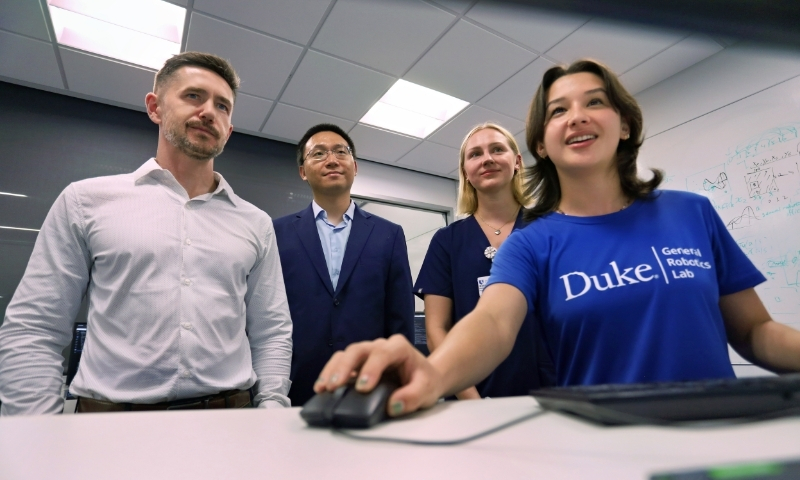Duke School of Nursing and Pratt School of Engineering Launch Collaborative Research Program
New trans-disciplinary partnership with Pratt School of Engineering provides pilot funding to support innovative, collaborative research projects that will contribute to the transformation of biomedical solutions to health inequities.

Duke University School of Nursing and Pratt School of Engineering have awarded funding to faculty investigators for four interdisciplinary projects bridging nursing and engineering science. The goal of this pilot program is to support research that accelerates knowledge and technology development to tackle health inequities, create innovative solutions considering social determinants of health, and evaluate results to improve patient care.
“Over the last several years, researchers at the School of Nursing had become increasingly interested in collaborating with researchers in Pratt because the changing healthcare landscape in the US requiring innovative solutions to the delivery of care,” said Dr. Sharron L. Docherty, Vice Dean for Research, Duke University School of Nursing.
After meetings between Dr. Docherty, and Dr. Sharon Gerecht, Associate Dean for Research & Infrastructure at Pratt, the teams decided to move forward to develop a collaborative partnership. The partnership's short-term objectives are to develop mutual awareness and orientation to the research programs of both schools, identify key collaboration opportunities, support team building and provide funding for pilot projects. In the long term, the goals are to develop large-scale research initiatives to support a center grant proposal and explore opportunities for joint scientific training programs with NIH and NSF.
“Interdisciplinary partnerships between the Pratt School of Engineering and the Duke School of Nursing are crucial for advancing healthcare innovation,” said Dr. Gerecht. By combining engineering expertise with clinical insights from nurse scientists, we can develop cutting-edge solutions that improve patient outcomes and drive the future of medical technology.
“Collaborations between nurse and engineering scientists can create transdisciplinary research teams who can move beyond merely the crossing of disciplines, to holistically integrate the fields of nursing and engineering knowledge and create solutions to problems related to health inequities,” added Dr. Docherty.
In July, each team, comprised of investigators from both schools, were awarded up to $75,000 for their pilot project. The four awarded pilot projects include:
Proof of Concept: Use of a soft wireless device placed at the suprasternal notch to support communication in people with ALS, their care-partner and a member of their social network
Xiaoyue Ni, PhD, Assistant Professor, Pratt School of Engineering
Donald Bailey, PhD, RN, FAAN, Chair, Healthcare in Adult Populations Division, Associate Professor, School of Nursing
Amyotrophic Lateral Sclerosis (ALS) severely impacts motor functions related to speech, hindering social engagement. Research highlights the importance of maintaining social networks for adults with chronic illnesses to support coping and quality of life. Augmentative and alternative communication (AAC) devices help compensate for speech loss and improve quality of life. However, a systematic review found that complex AAC devices are mainly used for therapeutic interactions rather than everyday conversations, missing an opportunity to reduce social isolation. This collaboration is a proof-of-concept study to establish the acceptability, feasibility and benefit to a person with ALS and their care-partner of a skin-compliant, lightweight and wireless communication device that sits at the suprasternal notch—the divot between where the two sides of the collarbone and throat tendons meet—that measures body vibrations and movements to support and enhance communication.
Advancing Virtual Care through Nurse-Guided Telerobotics
Ryan Shaw, PhD, RN, Associate Professor and Director, Health Innovation Lab, Duke School of Nursing
Boyuan Chen, PhD, MS, Assistant Professor and Director, General Robotics Lab, Duke Pratt School of Engineering
Virtual care nursing, a telehealth service, uses video conferencing to provide remote care to patients at home and in hospitals, supporting bedside care teams. It includes activities like assessments, admissions, discharges, counseling, and care support. This service helps address staffing shortages and workload issues, improving patient outcomes and satisfaction, especially in underserved rural areas. However, it can’t handle tasks requiring physical presence. Robotics could help, however, integrating this into nursing is complex. Robots need to operate safely in varied environments, learn new skills, and adapt to different users. This collaboration aims to advance nursing and robotics by recruiting nurses to train AI models to instruct robots in performing basic care tasks remotely.
Anticipating future heatwave impacts on rural mental health and substance use: implications for the development of nurse-led interventions
Marta Zaniolo, PhD, MS, Assistant Professor, Pratt School of Engineering
Devon Noonan, PhD, MPH, FNP-BC, Associate Professor, Duke School of Nursing
It’s been well established that urban areas have pockets where a lack of vegetation and permeable surfaces, along with many other factors, create “urban heat islands” where temperatures soar much higher than surrounding areas. While cities are starting to allocate more resources to help these residents, rural areas face rising temperatures and lack city resources. This combination is linked to mental health issues and substance use. Researchers are working to see if they can use AI and climate data to predict heat-related thresholds that lead to an increase in mental health and substance use related hospitalizations. The team plans to put together a community advisory board to incorporate community input when building the model, but also to translate their findings into actionable solutions for rural communities throughout eastern North Carolina.
Sensor System for Monitoring Communication Difficulties at Home
Darina Petrovsky, PhD, RN, Assistant Professor, Duke School of Nursing
Xiaoyue Ni, PhD, Assistant Professor, Pratt School of Engineering
Persons living with dementia experience social isolation and dysfunction, often relying on their care partner as their disease progresses while experiencing breakdowns in communication with their families and care partners. Improving relationship quality between the caregiver and the person can help lessen the caregiver’s burden and improve other related outcomes. However, we must first identify those who are experiencing communication difficulties using unobtrusive wearable technology. This proposal aims to examine the feasibility and acceptability of a low-cost, at-home, wearable sensor for the detection of communication difficulties between dementia patients and their care partner.